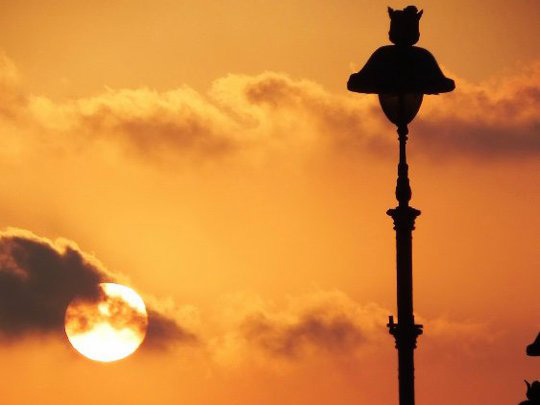I still remember the first Ramadan I spent in Cairo, eight years ago. Dawn broke in shades of pink and blue over the Mother of the World that first morning. City lights glittered still, their reflections rising and falling in the movement of the Nile, a few light clouds hovering above Cairo’s usual blanket of fog. As the clock ticked toward 5am, I watched the sun rise; just moments before the call to the dawn prayer had sounded from the mosque behind my building. The adan moved across Cairo in ripples, signaling the start of the day’s fast from a thousand minarets.
Ramadan is a holy month for Muslims, a month of fasting, reflection, and prayer where each kind or generous deed is worth 100. The fast, from sunrise to sunset, is complete: nothing may be consumed (children are exempt from the fast, as are people who are traveling or sick and require medicine and menstruating women), and those who drink alcohol usually abstain for the month. The phrase ‘Ramadan Kareem,’ which literally means ‘generous Ramadan,’ is everywhere. I recall I had been told Cairo was the best place to experience Ramadan – and experiencing it for the first time, I understood why.
A few minutes before the call to the maghreb (evening) prayer, I went down and walked through Zamalek. Its usually bustling streets were nearly bereft of cars, much less Cairo’s ubiquitous traffic, and the usual throngs of people were absent. Those still moving around were mostly foreigners.
The Egyptian people were not entirely absent from the streets of Cairo; they were simply absent in the normal sense. They were all nearly motionless, seated (mostly silently) at one of the many long tables that crowded much of the available space on sidewalks and in alleyways, or perhaps at home with friends and family.
During Ramadan, Egypt’s poor eat better than they do at any other time of the year. It is impossible to go hungry. Food is provided every evening at iftar, the breaking of the fast, by charity, various wealthy individuals, and mosques. Anyone, I have been told, is welcome to sit and join in the breaking of the fast.
As the moment of iftar arrived, mosques across the city announced sunset and there was sudden commotion as the Muslim people of Cairo broke their fast. Walking along the street, I was invited to join half a dozen different groups of people in their meals – although I declined the offers, I did accept a cup of dark, sweet juice, and thus broke my fast along with the rest of the city.
For the first two weeks of Ramadan, I fasted. Most of my friends were fasting, and I decided that if I was going to experience Ramadan in Cairo, I might as well experience Ramadan in Cairo (personally, I didn’t have a problem not eating all day – the difficulty of the fast arose with not being able to drink, especially under Cairo’s heat). I finally broke my fast about a week into the semester, deciding curiosity was not a good enough reason to not eat when I had upwards of seven hours of class in a day.
Every year since I’ve fasted for the first week of Ramadan, or at least for a few days if I’m not in Egypt. I’m not Muslim, I’m not Egyptian – but I appreciate the time of reflection, the self discipline, and a sense of community which is hard to describe. Most people who fast do so for religious reasons, but there are many others who fast for part or all of Ramadan for other reasons. For some, it’s family rules and expectations; for others, it’s a time to cleanse and refresh themselves, even if they don’t pray or aren’t religious; and others, like me, have their own reasons.
One trend runs through the dozens of Ramadan memories I’ve collected in the years since watching the sun rise that first morning. Whether I was curled up on a couch eating take-out for iftar and watching That 70s Show with my roommate, surrounded by dozens of friends and members of my (adopted) family throughout the night, or mixing sage and cardamom into a cup of tea just before sohour near Al Hussein, every memory is filled with laughter and a sense of community.



